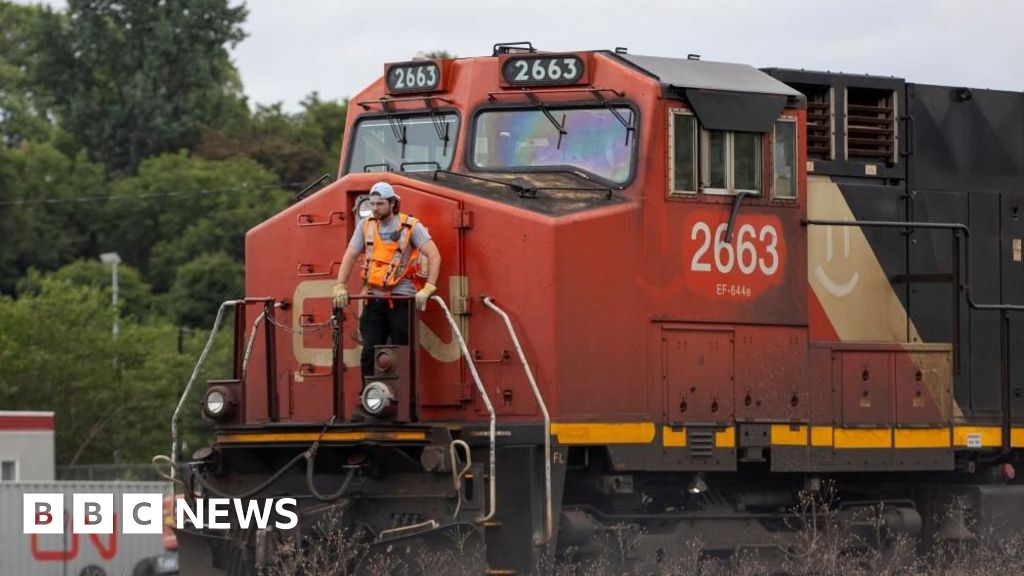Crucial supply chains are under threat across North America after a rail labour dispute in Canada led to shutdown of freight traffic and disrupted commuters.
The country’s two largest operators, Canadian National Railway (CN) and Canadian Pacific Kansas City (CPKC), locked out nearly 9,300 workers after midnight on Thursday (04:00 GMT), after failing to clinch a late deal with the Teamsters union.
Canada sends around 75% of all the goods it exports to the US, mostly over rail. A prolonged dispute could disrupt shipments of a wide range of goods, from grains and beans to potash, coal and timber.
Negotiations have stalled over shift scheduling, fatigue provisions and wages.
Talks continued late into the evening on Wednesday, CBC reported. Earlier in the day, Prime Minister Justin Trudeau made a last-minute appeal to both sides to keep up their attempts to reach a deal.
“Millions of Canadians, of workers, of farmers, of businesses right across the country are counting on both sides to do the work and get to a resolution,” he said in brief remarks, without taking questions.
Dozens of industry and trade organisations warned last week in an open letter that the disruption would have “an immediate impact” from coast-to-coast and damage Canada’s reputation as a trading partner.
“Factoring in the millions of Canadian jobs that would be impacted, the magnitude of the disruption is daunting,” it said.
The US and Canadian chambers of commerce followed up earlier this week, warning of the potential “devastating” impact of the stoppage on Canadian businesses and families, but also the US economy.
A group of agriculture trade associations has urged Ottawa to step in, but the government has so far resisted calls for binding arbitration.
Labour agreements for both railways expired at the end of last year.
During the lockout, rail networks in the US and Mexico will continue to operate. But a stoppage north of the border could be felt across North America.
US Transport Secretary Pete Buttigieg said earlier this week that he was monitoring rail negotiations and the potential impact on the cross-border flow of goods.
Some C$380bn (£214bn) in goods is moved by rail each year and railways move half of the country’s goods for export, according to the Railway Association of Canada.
Ahead of the full shutdown, both CPKC and CN began pausing some shipments. Embargoes were put in place on chemicals such as ammonia, used as a fertiliser, and chlorine, used in water treatment, to avoid them being stranded on the rails.
Shipping firm Maersk on Monday stopped accepting shipments destined for Canada meant to move by rail and that could not be transported on heavy trucks instead.
The Canadian Pork Council has warned that since the industry relies on rail to get feed to its animals, their welfare is at risk.
“Canada’s red meat processors need stable, reliable supply chains to run their businesses,” said Chris White, CEO, Canadian Meat Council in a statement.
“Interruption in service will result in millions of dollars in losses, irreversible reputational damage, environmental disposal challenges, and enormous waste.”
The shutdown could also snarl commuter transit in major Canadian cities like Toronto or Montreal as some dispatchers will be on a work stoppage.
Professor Barry Prentice, director at the University of Manitoba Transport Institute, said the government would likely pass back-to-work legislation in the coming days if the sides couldn’t come to an agreement, as has been done in similar past disputes.
“This isn’t the best way to run the show,” he told the BBC.
“But it seems to be the playbook and and we’re back on this merry-go-round again,”
With additional reporting from Michelle Fleury

